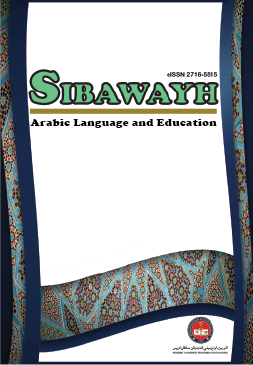Improving Arabic Vocabulary among Form 2 Students at Temerloh Distric, Pahang using the 'Snap Card' Game
DOI:
https://doi.org/10.37134/sibawayh.vol5.2.5.2024Keywords:
Snap Card intervention, Arabic vocabulary mastery, secondary education, language acquisition, student motivation, interactive learningAbstract
This study aims to investigate the effectiveness of the Snap Card intervention in enhancing the mastery of Arabic vocabulary among secondary school students. Specifically, the research focuses on form 2 students, located in Temerloh, Pahang. The total population consisted of 42 students, while the sample comprised 22 students, selected through a simple random sampling technique. The study utilized both quantitative and qualitative research methods, employing pre-test and post-test assessments as well as semi-structured interviews to evaluate the impact of the intervention. The findings indicate that the Snap Card intervention significantly improved the students' ability to recall and master Arabic vocabulary, as evidenced by the comparison of pre-test and post-test scores. In addition to enhanced vocabulary retention, the study also observed a marked increase in students' motivation to learn Arabic, suggesting that the intervention positively influenced students' attitudes toward language learning. The qualitative data obtained from interviews further supported these findings, indicating a greater enthusiasm for and engagement in Arabic language lessons among participants. The study concludes that the Snap Card intervention is an effective and efficient tool for improving the acquisition of Arabic vocabulary and motivating students in the learning process. This intervention presents a promising approach to addressing common challenges faced in language acquisition, particularly in enhancing vocabulary retention and learner motivation. The results underscore the potential of interactive and engaging methodologies in facilitating language learning, thereby contributing to the broader body of research on effective language pedagogy.
Downloads
References
Abdull Majid, M. A. M., & Abdul Ghani, M. T. (2024). Penerokaan Elemen Bahan Bantu Mengajar yang menyokong Peningkatan Kemahiran Komunikasi Bahasa Arab dalam kalangan pelajar Sekolah Menengah di Daerah Setiu, Terengganu. Jurnal Pendidikan Bitara UPSI,17(1), 105–115. https://doi.org/10.37134/bitara.vol17.1.10.2024
Ali, A., Abbas, L. N., & Mohmad Sabiri, A. (2021). Keberkesanan pembelajaran gamifikasi dalam pencapaian pelajar bagi topik nombor kompleks: Effectiveness of gamification learning in students' achievement for complex number topic. Online Journal for TVET Practitioners, 6(2), 108–122.
Aluwi, A. M. & Abdul Ghani, M. T. (2023). Penguasaan Kosa Kata Terhadap Penulisan Bahasa Arab dalam Kalangan Pelajar Sekolah Menengah Agama Khairiah: Kajian daripada Perspektif Guru [Vocabulary Mastery of Arabic Language Writing Among Khairiah Religion Secondary School Students: AStudy from The Teacher's Perspective], Sains Insani, 8(2), 294-303.
Ching, N. C., & Nasri, N. M. (2021). Penggunaan kaedah visualisasi dalam pengajaran dan pembelajaran perbendaharaan kata Bahasa Inggeris. Jurnal Dunia Pendidikan, 444-449.
Fauziddin, M., & Fikriya, M. (2020). Mengenal kosakata Bahasa Arab melalui permainan kartu huruf hijaiyah yang dilengkapi kosakata. Journal for Education Research, 46-54.
Kamalul Bahri, K. S. (2024). Grafik dalam pembelajaran dan pengajaran ujian penilaian kelas KAFA (UPKK) tahun 5. Kupas Seni, 12(1), 93–104.
Kitikedizah, H., & Lubis, M. A. (2022). Kepentingan gamifikasi dalam pengajaran dan pemudahcaraan (PdPc) pendidikan Islam. ASEAN Comparative Education Research Journal on Islam and Civilization (ACER-J), 5(10), 58–64.
Mohamed Shalikin, N. H. (2024). Kepelbagaian pendekatan pengajaran dalam kalangan guru mata pelajaran Al-Lughah Al-‘Arabiyyah Al-Mu’asirah: The Diversity of Teaching Approaches Among Teachers of Al-Lughah Al-Arabiyyah Al-Mu’asirah Subject at Jeram Secondary Religious School, Selangor. SIBAWAYH Arabic Language and Education, 5(1), 25–35. https://doi.org/10.37134/sibawayh.vol5.1.3.2024
Nugrawiyati, J. (2016). Pembelajaran kosa kata Bahasa Arab di Madrasah Ibtidaiyah. El-Wasathiya: Jurnal Studi Agama, 144-156.
Suhaimah, B., Moh Arif, M., & Dyah Ayu, N. (2021). Investigating writing difficulties in essay writing: Tertiary students' perspectives. English Language Teaching Educational Journal, 4(1), 61–73.
Taib, S. H., Ismail, M. A., & Lubis, M. A. L. A. (2019). Inovasi kesepaduan dan strategi pengajaran dan pembelajaran di era revolusi industri 4.0. ASEAN Comparative Education Research Journal on Islam and Civilization (ACER-J), 3(2), 38–54.
Yakob, M. H. (2023). Use of Lughatul Fasli among Arabic Language Training Teachers at Sultan Idris Education University. SIBAWAYH Arabic Language and Education, 4(2), 99–106. https://doi.org/10.37134/sibawayh.vol4.2.10.2023
Yakob, M. H. & Abdul Ghani, M. T. (2024). [MS] Cabaran Penggunaan Lughatul Fasli dalam Kalangan Guru Pelatih Bahasa Arab di Universiti Pendidikan Sultan Idris: The Challenges of Using Lughatul Fasli among Arabic Language Trainee Teachers at Sultan Idris Education University. Afaq Lughawiyyah, 2(2), 339–351.
Zakiah, N. A. (2022). An analysis of essay writing difficulties faced by the third semester students in English language education of FKIP Universitas Islam Riau (Undergraduate thesis). Universitas Islam Riau.
Downloads
Published
Issue
Section
License
Copyright (c) 2024 Yasmin Hussain, Taj Rijal Muhamad Romli

This work is licensed under a Creative Commons Attribution-NonCommercial-ShareAlike 4.0 International License.





